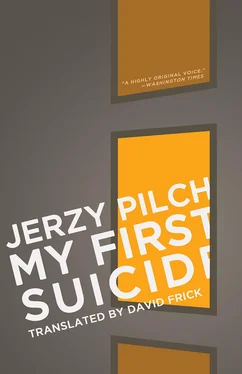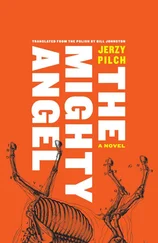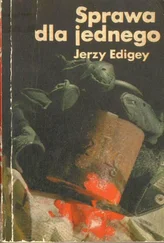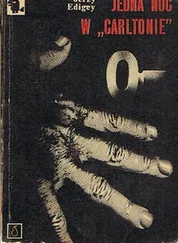As it would turn out, this was not an empty omen. I don’t know whether I had managed to push the button on the remote control even ten times when steps resounded in the hallway, and in a moment someone knocked on the door. A thousand hopes, a thousand disbeliefs, a thousand uncertainties, a thousand sweet visions flitted through my head. Flitted and vanished, just as soon as I had opened the door.
A tall, skinny old man with a neurotic face stood in the hallway. I had seen him less than an hour ago and remembered him well. He had been at the book signing; he sat in the second row and didn’t ask a single question, although it was clear that he really wanted to. I had seen him ten minutes or so ago, perhaps thirty or so, but even if I had seen him a thousand years ago, I still would have remembered him: he had the sort of face you never forget. In his features and gaze, absolute madness was joined with the most elevated dignity — a combination that was common in the nineteenth, and even in the twentieth century; today it is completely rare. He was dressed in a light colored poplin overcoat, he held under his arm an ancient, massive pigskin briefcase, stuffed to the brim.
“I beg your pardon most humbly for disturbing your peace,” he said with the strong and well-adjusted voice of someone who is used to the bold expression of his thoughts. “I beg your pardon most humbly for disturbing your peace. I wanted to call from the lobby, but poor Emil… is already in bad shape…”
“The receptionist?” My guess didn’t require much perspicacity. “Indeed, I also noticed that, in spite of the early hour, he is already somewhat…”
“Early hour?” The old man smiled broadly. “Master… Can it be that the master, contrary to appearances, has entirely broken with his roots? Can you have forgotten at what hour the lights are turned out at home, the curtains drawn? It isn’t yet nine, but for Lutherans it is the middle of the night, or in any case a very late hour, and Emil has a sacred right to lay his weary head down on the counter. Well… but I just, counting on a certain, so to say, relativism between our time and the time of the rest of the world, I make bold at such a…” he glanced at me questioningly, “basically, I don’t know, whether it is an hour that is at all acceptable…”
We were still standing in the doorway. I hadn’t invited him into the room, because I was counting on the business with which he had come to me to be short; that he only wanted to ask for a belated autograph, because at the book signing he hadn’t had a copy of my book; that he was bringing the scarf that I had left in the coat check; that he wished only now, because he didn’t have the courage before other people, to offer me a volume of versified memoirs, which he had published at his own expense; that — whatever he wanted from me — he would vanish immediately.
It was as it always was. Just a minute ago I had been praying in the depths of my soul that someone would appear, that something would happen; but now I was absolutely certain that checking whether there might be a detective show on one of the five foggy channels was the one thing I desired to devote myself to — with passion and until late in the night. Now the endlessly long postponement of the endlessly long shower seemed to me an endangered pleasure that I needed to defend. How many times was it like that? How many times had I prayed for the presence of someone, and my prayers were heard, and God sent someone’s presence, and I, in the greatest panic, didn’t even allow that person to cross the threshold?
“I forewarn you that my business is not quick or perfunctory.” It didn’t surprise me that he was reading my mind. “I want to tell you a story.”
I wasn’t keen on other people’s stories. A least a year before, I had realized that there was no way, not even until the end of my life, that I would manage to write down what I myself remember. I wasn’t curious about his story, but I also sensed more and more clearly that it was unavoidable.
“Please,” I said with restrained cordiality, “come in, except that I don’t have anything, I have absolutely nothing at all to offer you.”
“I am invading your territory, but I don’t come empty handed.” With a sure step he entered the room, opened the briefcase, which was filled to the brim with various papers, extracted from it a gigantic bottle, its cap sealed with wax, and all of it wrapped in newspaper, as well as an equally gigantic thermos.
“They have glassware here, as far as I recall.” On an absurd, utterly useless, typical hotel chest of drawers stood a bottle of Ustronianka mineral water and two glasses. “Please, if I may allow myself such an eccentricity. True, you are at home here, but in K., even At the Sign of the Falcon , I feel that I am the host. I have spent a good bit of my life in the bar downstairs, and besides, you know, I am familiar with every square inch here. That’s right. I know the history, geography, and substance of every local square inch.”
Only now did he take off his overcoat. He was wearing an archaic brown suit, perhaps from the fifties, or perhaps even from before the war.
“Help yourself, assuming, of course, you do drink. Because people say various things. But if people say various things, then that means that you do, in fact, drink.”
“With you, I’ll have a drink,” I said with the resignation that I recall from old times, and which ritually signified, at the beginning, a few hours — and later, a few days — torn out of my life story.
“Perfect.” With a tender gesture he grasped the bottle and skillfully rapped it on the edge of the table so that the wax seal split into two halves like a walnut. He removed the screw cap that had been underneath, and he poured into the glasses a proper measure of the cloudy drink for each of us. I caught the cold scent of October grass.
“Juniper berry vodka. Homemade, it goes without saying. It goes wonderfully with hot mint tea,” he rapped a finger on the thermos.
“No thanks, for now,” I shook my head.
“I understand perfectly. Old school. Without a chaser. Your health.”
We each drank two rounds in silence. A warm sea current passed through us from head to foot. We took out cigarettes, lit them up; the smell of smoke was united with the smell of the juniper berry vodka, which was so intense that it seemed synthetic. “Are you reading Zweig?” He glanced at the book lying on the bed. “A forgotten author and somewhat, I would say, second-rate.”
“I am reading him carefully,” I responded. “I am reading him carefully and with delight. With absolute delight.”
“Carefully and with delight? Aren’t you exaggerating a bit? Chess Story is great, but the rest?”
“The rest too, God help me. Besides, you know, almost everyone would like to be a second Thomas Mann. But I wouldn’t have anything against being a second Stefan Zweig. In youth, a person worships Mann, Dostoevsky, Faulkner, but slightly scorns Zweig, Chekhov, or Steinbeck. In old age, this changes, even turns the other way around completely.”
“You know, there’s no great gulf between Dostoevsky and Chekhov. As for the rest — I’d have to give it some thought. Your ‘old age’ is also rather debatable. Especially, so to say, in my context. But I hope you dream of being a second Stefan Zweig rather in quotation marks, and not with all the details?” He pronounced the name of the author of Impatient Heart with a grotesque German articulation and smiled.
“With all the details is an impossibility,” I answered. “And besides, there isn’t any sense in it.”
“That’s the point,” he livened to the topic somehow disproportionately. “That’s the whole point, that if even one detail is lacking, it is impossible to repeat… I do not compare myself in the least degree with you, but I also dabble in writing, and it is precisely this problem… The problem of a certain lack… the lack of analogical detail is key for me. Yes, sir. I dabble in writing, and I have a few of my works with me.” He pointed to the briefcase standing next to his chair, which still — as if nothing had been removed from it — gave the impression of being stuffed to bursting.
Читать дальше












